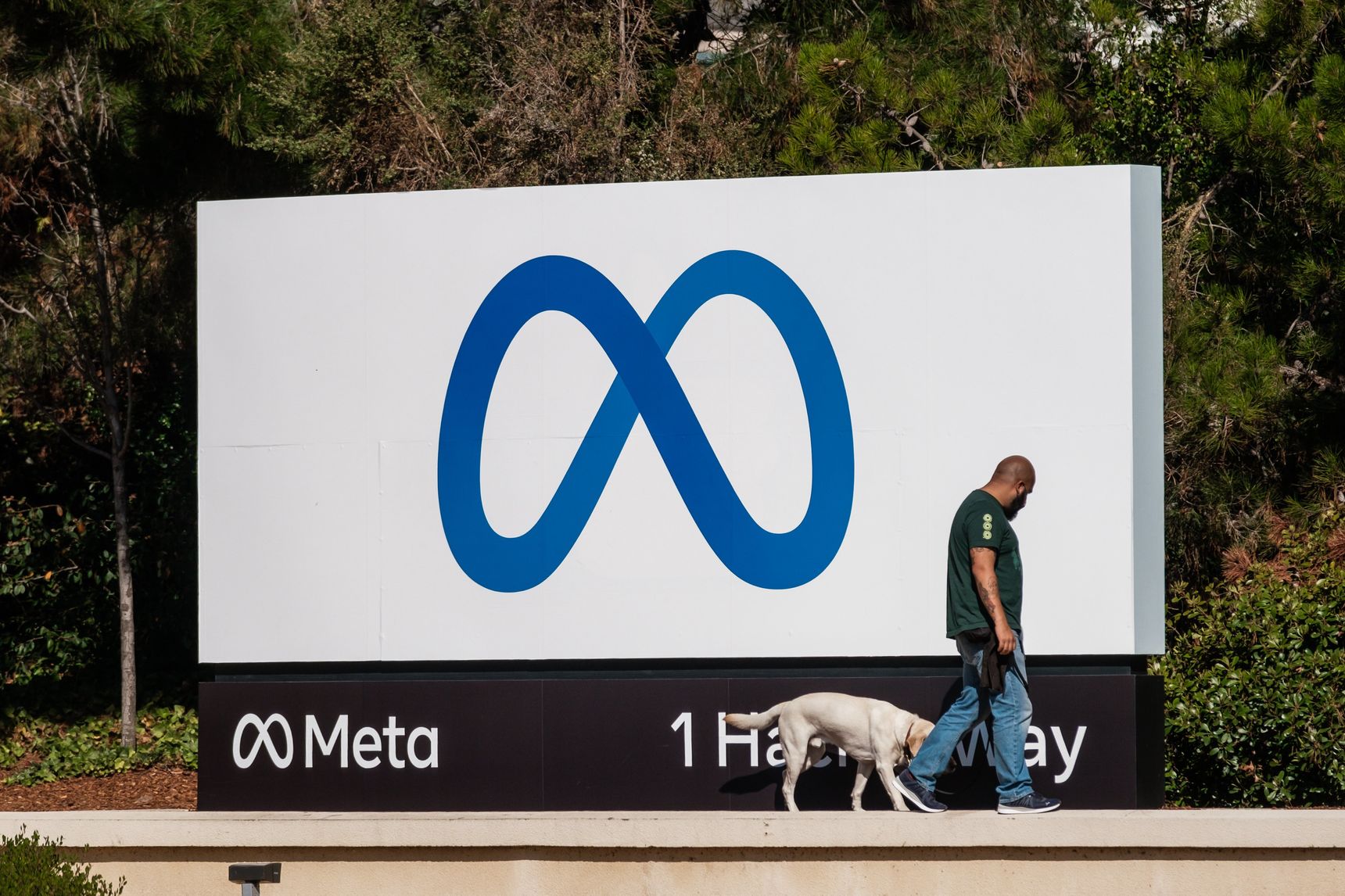Disappointing Meta Earnings Sends Shudders Through Stock Market
Tech stocks have been ‘priced way beyond perfection’ and now face scrutiny as interest rates are poised to rise.
Facebook’s parent company shed more than $230 billion in market value Thursday, a one-day loss that is the biggest ever for a U.S. company and increases pressure on a stock market long powered by technology shares.
Meta Platforms Inc. (formerly known as Facebook Inc.) gave a disappointing financial forecast, helping the major indexes snap a four-session winning streak. The tech-heavy Nasdaq Composite index dropped 3.7%, its worst day since September 2020, while the S&P 500 fell 2.4%.
PayPal Holdings Inc. and Spotify Technology SA also spooked investors in recent days, when the payments giant lowered its 2022 profit outlook and the streaming company elected not to provide annual guidance. Both companies suffered sharp drops in their stock prices.
The setbacks reflect the increased scrutiny companies are under as major U.S. stock indexes remain near record highs and the Federal Reserve is preparing to raise interest rates for the first time since 2018. Rising rates tend to reduce the multiples that investors are willing to pay for a share of company profits, a trend that stands to mean pain for stocks already trading at lofty valuations. That has put heightened pressure on the companies to show their financial results justify their price tags. In recent days, several have fallen short, raising concerns among investors that further declines in major indexes could lie ahead.
“The level of forgiveness has gone down,” said Daniel Genter, chief executive and chief investment officer at RNC Genter Capital Management. “When boards come to their shareholders to confess their sins, they’re just not going to be pardoned with one Hail Mary.”
The Facebook parent company surprised investors with a deeper-than-expected decline in profit and a downbeat outlook. The company said it expects revenue growth to slow and shared that it lost about one million daily users globally. Shares declined 26%, their worst daily performance since they started trading in 2012.
The company’s challenges include a new ad-privacy policy from Apple Inc. that Meta expects to cost it more than $10 billion in lost sales for 2022. The requirement that apps ask users whether they want to be tracked limited the ability to gather data used to target digital ads, driving advertisers to change their spending.
Meta’s $232 billion drop in market value exceeds the record that Apple Inc. set in September 2020 when the iPhone maker lost about $182 billion in a single day, according to Dow Jones Market Data.
Some strategists said the recent slide in shares of speculative tech companies should serve to remind investors that a robust market rally relies on advances by a variety of stocks. And they warn they expect more big stock swings ahead at any hint of slowing growth.
“The market can’t just be driven by a small number of megacap companies or tech companies,” said Yung-Yu Ma, chief investment strategist at BMO Wealth Management. “There should start to be more of a recognition that it’s not going to be technology that leads us out of this pullback.”
Earnings season had been overshadowed until recent days as investors fretted over the Fed’s plans to raise rates. They sold stocks across sectors, helping to send the S&P 500 down 5.3% in January, its worst monthly performance since the March 2020 slump.
Results out of the tech segment haven’t been all bad. Google parent Alphabet Inc. reported robust sales growth and unveiled plans for a stock split this week, helping the company add more than $135 billion in market value Wednesday. And Amazon.com Inc. said after Thursday’s closing bell that profits nearly doubled in the holiday period, helping send its shares up about 15% in late trading.
Shares of Snap Inc. and Pinterest also got a big bump after hours. Snap posted its first quarterly profit, and Pinterest said it expects first-quarter revenue to grow sharply. All three stocks had declined in the regular session ahead of the reports.
Meta, PayPal and Spotify entered 2022 at rich valuations. While the S&P 500 ended December trading at 21.5 times its projected earnings over the next 12 months, Meta was trading at 23.6 times, PayPal at 36 times and Spotify at 543.9 times, according to FactSet. Spotify isn’t an index constituent. By Thursday, Meta’s multiple had pulled back to 18 times forward earnings, while PayPal traded at 25.6 times. Spotify, meanwhile, traded at 666.2 times, after analysts cut their earnings forecasts.
“Those stocks were really priced way beyond perfection,” Mr. Genter said. “People are saying, well, guess what, perfection is not here.”
PayPal lowered its profit outlook for 2022 and abandoned a target it set last year of roughly doubling its active user base. Executives said business this year will be pressured by forces including inflation, supply-chain problems, the Omicron variant and the runoff in government stimulus. Shares slumped 25% Wednesday in their worst selloff on record and continued sliding Thursday.
And Spotify, which is embroiled in a controversy over Joe Rogan’s podcast, said it added users but declined to give annual guidance, pulling shares down 17% on Thursday.
Broadly, the corporate earnings season has surpassed expectations. With results in from about half the constituents of the S&P 500, analysts estimate that profits from index constituents rose 29% in the holiday quarter from a year earlier, according to FactSet. That is up from forecasts for 21% growth at the end of September.
 Copyright 2020, Dow Jones & Company, Inc. All Rights Reserved Worldwide. LEARN MORE
Copyright 2020, Dow Jones & Company, Inc. All Rights Reserved Worldwide. LEARN MORE
This stylish family home combines a classic palette and finishes with a flexible floorplan
Just 55 minutes from Sydney, make this your creative getaway located in the majestic Hawkesbury region.
Impact investing is becoming more mainstream as larger, institutional asset owners drive more money into the sector, according to the nonprofit Global Impact Investing Network in New York.
In the GIIN’s State of the Market 2024 report, published late last month, researchers found that assets allocated to impact-investing strategies by repeat survey responders grew by a compound annual growth rate (CAGR) of 14% over the last five years.
These 71 responders to both the 2019 and 2024 surveys saw their total impact assets under management grow to US$249 billion this year from US$129 billion five years ago.
Medium- and large-size investors were largely responsible for the strong impact returns: Medium-size investors posted a median CAGR of 11% a year over the five-year period, and large-size investors posted a median CAGR of 14% a year.
Interestingly, the CAGR of assets held by small investors dropped by a median of 14% a year.
“When we drill down behind the compound annual growth of the assets that are being allocated to impact investing, it’s largely those larger investors that are actually driving it,” says Dean Hand, the GIIN’s chief research officer.
Overall, the GIIN surveyed 305 investors with a combined US$490 billion under management from 39 countries. Nearly three-quarters of the responders were investment managers, while 10% were foundations, and 3% were family offices. Development finance institutions, institutional asset owners, and companies represented most of the rest.
The majority of impact strategies are executed through private-equity, but public debt and equity have been the fastest-growing asset classes over the past five years, the report said. Public debt is growing at a CAGR of 32%, and public equity is growing at a CAGR of 19%. That compares to a CAGR of 17% for private equity and 7% for private debt.
According to the GIIN, the rise in public impact assets is being driven by larger investors, likely institutions.
Private equity has traditionally served as an ideal way to execute impact strategies, as it allows investors to select vehicles specifically designed to create a positive social or environmental impact by, for example, providing loans to smallholder farmers in Africa or by supporting fledging renewable energy technologies.
Future Returns: Preqin expects managers to rely on family offices, private banks, and individual investors for growth in the next six years
But today, institutional investors are looking across their portfolios—encompassing both private and public assets—to achieve their impact goals.
“Institutional asset owners are saying, ‘In the interests of our ultimate beneficiaries, we probably need to start driving these strategies across our assets,’” Hand says. Instead of carving out a dedicated impact strategy, these investors are taking “a holistic portfolio approach.”
An institutional manager may want to address issues such as climate change, healthcare costs, and local economic growth so it can support a better quality of life for its beneficiaries.
To achieve these goals, the manager could invest across a range of private debt, private equity, and real estate.
But the public markets offer opportunities, too. Using public debt, a manager could, for example, invest in green bonds, regional bank bonds, or healthcare social bonds. In public equity, it could invest in green-power storage technologies, minority-focused real-estate trusts, and in pharmaceutical and medical-care company stocks with the aim of influencing them to lower the costs of care, according to an example the GIIN lays out in a separate report on institutional strategies.
Influencing companies to act in the best interests of society and the environment is increasingly being done through such shareholder advocacy, either directly through ownership in individual stocks or through fund vehicles.
“They’re trying to move their portfolio companies to actually solving some of the challenges that exist,” Hand says.
Although the rate of growth in public strategies for impact is brisk, among survey respondents investments in public debt totaled only 12% of assets and just 7% in public equity. Private equity, however, grabs 43% of these investors’ assets.
Within private equity, Hand also discerns more evidence of maturity in the impact sector. That’s because more impact-oriented asset owners invest in mature and growth-stage companies, which are favored by larger asset owners that have more substantial assets to put to work.
The GIIN State of the Market report also found that impact asset owners are largely happy with both the financial performance and impact results of their holdings.
About three-quarters of those surveyed were seeking risk-adjusted, market-rate returns, although foundations were an exception as 68% sought below-market returns, the report said. Overall, 86% reported their investments were performing in line or above their expectations—even when their targets were not met—and 90% said the same for their impact returns.
Private-equity posted the strongest results, returning 17% on average, although that was less than the 19% targeted return. By contrast, public equity returned 11%, above a 10% target.
The fact some asset classes over performed and others underperformed, shows that “normal economic forces are at play in the market,” Hand says.
Although investors are satisfied with their impact performance, they are still dealing with a fragmented approach for measuring it, the report said. “Despite this, over two-thirds of investors are incorporating impact criteria into their investment governance documents, signalling a significant shift toward formalising impact considerations in decision-making processes,” it said.
Also, more investors are getting third-party verification of their results, which strengthens their accountability in the market.
“The satisfaction with performance is nice to see,” Hand says. “But we do need to see more about what’s happening in terms of investors being able to actually track both the impact performance in real terms as well as the financial performance in real terms.”
This stylish family home combines a classic palette and finishes with a flexible floorplan
Just 55 minutes from Sydney, make this your creative getaway located in the majestic Hawkesbury region.






















